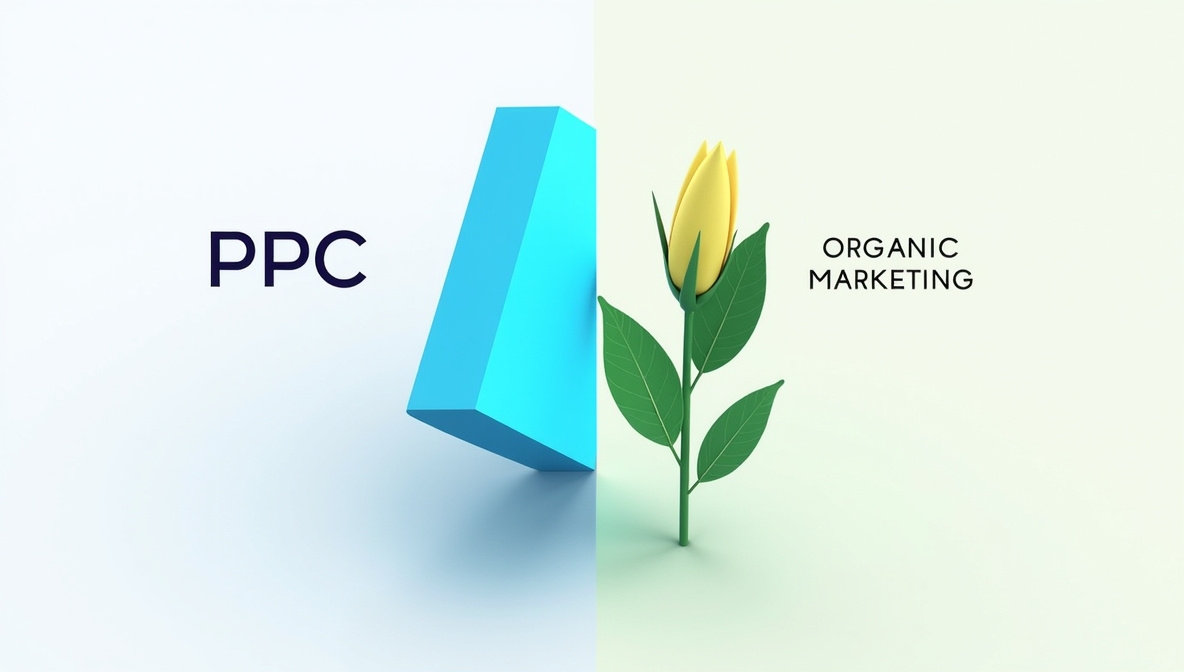Both pay-per-click (PPC) and organic marketing play vital roles in digital growth, but deciding which strategy to prioritize depends on your goals, budget, and timeline. PPC delivers immediate traffic and visibility, while organic marketing builds long-term authority and trust. The right choice hinges on how quickly you need results and how sustainable you want your efforts to be.
Understanding PPC Marketing
PPC advertising involves paying for ad placements on search engines, social media, or other digital platforms. Every time a user clicks on an ad, the advertiser is charged a fee.
Advantages of PPC
- Instant Visibility – Ads appear at the top of search results immediately after launch.
- Targeted Reach – Enables precise audience targeting based on demographics, location, interests, and behavior.
- Scalability – Campaigns can be adjusted in real time based on performance data.
- Clear ROI Measurement – Provides direct insights into conversion rates and cost-per-click (CPC).
- Competitive Edge – Helps smaller businesses compete with established brands in high-competition industries.
Challenges of PPC
- Cost Dependency – Requires continuous investment; traffic stops when ad spend ceases.
- Bid Fluctuations – High-demand keywords can drive up costs, making campaigns expensive.
- Ad Fatigue – Users may become desensitized to ads, reducing engagement over time.
Understanding Organic Marketing
Organic marketing focuses on generating traffic without paid promotion. This includes search engine optimization (SEO), content marketing, social media engagement, and email outreach.
Advantages of Organic Marketing
- Long-Term Sustainability – Content remains accessible and continues driving traffic over time.
- Higher Credibility – Users often trust organic search results more than paid ads.
- Cost Efficiency – Requires an upfront investment in content and optimization but reduces reliance on paid campaigns.
- Broader Reach – Quality content attracts backlinks, social shares, and engagement, extending visibility.
- SEO Benefits – Optimized content ranks higher on search engines, increasing discoverability.
Challenges of Organic Marketing
- Slow Growth – Results take time, often requiring months of consistent effort.
- Algorithm Dependency – Search engines and social media platforms frequently update algorithms, impacting visibility.
- Continuous Optimization – Requires ongoing adjustments to maintain rankings and engagement.
Which One Should You Choose?
Your decision should align with your business objectives, available resources, and industry landscape.
If You Need Immediate Results
- Go with PPC. Running paid ads ensures instant visibility, making it ideal for product launches, time-sensitive promotions, or new businesses needing immediate exposure.
If You Want Long-Term Growth
- Prioritize organic marketing. SEO, content creation, and audience engagement yield sustained traffic and brand trust over time.
If You Have a Limited Budget
- Focus on organic efforts. Creating high-quality content, optimizing pages, and building backlinks can generate long-lasting traffic without recurring costs.
If You’re in a Competitive Industry
- Use PPC for short-term wins and organic for long-term authority. Highly competitive niches often require a balance, where paid ads generate quick conversions while organic content strengthens credibility.
If You Want Maximum Brand Exposure
- Combine both strategies. Paid ads amplify reach, while organic content establishes long-term authority. Together, they create a well-rounded approach that sustains growth and visibility.
How to Balance PPC and Organic Marketing
An integrated approach allows businesses to leverage the strengths of both strategies.
1. Use PPC to Test Keywords for SEO
Running paid campaigns helps identify high-performing keywords, which can then be incorporated into organic content for long-term ranking.
2. Invest in High-Quality Content
Strong content improves organic rankings while also supporting PPC campaigns by increasing ad quality scores and reducing CPC.
3. Optimize Landing Pages for Both PPC and SEO
A well-optimized page enhances user experience, improves organic rankings, and increases PPC conversion rates.
4. Retarget Organic Visitors with PPC
Use paid ads to re-engage users who visited your site through organic search but didn’t convert.
5. Monitor Performance and Adjust
Analyze traffic, engagement, and conversion data to refine both strategies and ensure they complement each other.
Final Thoughts
PPC and organic marketing each serve distinct purposes. If immediate traffic and conversions are the goal, PPC provides a quick solution. If sustainable growth and credibility matter more, organic marketing is the better option. The best approach often lies in leveraging both, using PPC for quick wins while building a strong organic foundation for long-term success.








